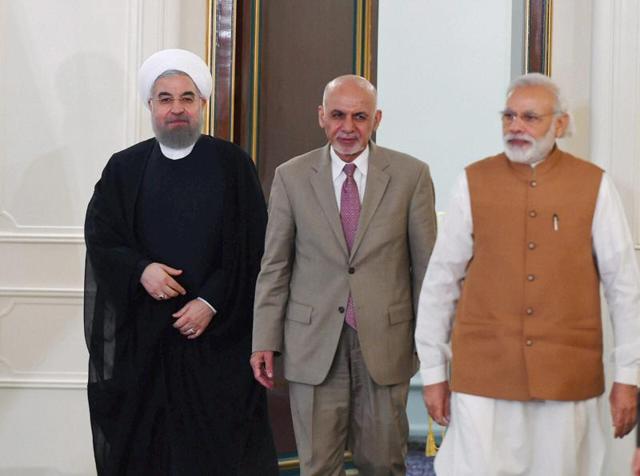
India signed on Monday a historic deal to develop the strategic port of Chabahar in Iran and agreed on a three-nation pact to build a transport-and-trade corridor through Afghanistan that could help halve the time and cost of doing business with Central Asia and Europe.

Developing the Chabahar port was seen as crucial for India because it will not only allow New Delhi to bypass Pakistan and access global markets but also counter China’s expanding influence in the Indian Ocean region. But the project’s land route through Afghanistan remains a security headache.
“We want to link with the world. (The) agreement …can alter the course of history of the region,” said Prime Minister Narendra Modi after the deal was signed in the presence of Afghan president Ashraf Ghani and Iranian President Hassan Rouhani.
“Studies show that… the corridor could bring down cost, time of cargo trade to Europe by about 50%.”
Separately, Modi – the first Indian prime minister to visit Iran in 15 years -- and Rouhani signed several deals, including on sharing intelligence to combat terrorism and increasing cultural and technology contact.
India has watched with unease Chinese funding for a strategic port in Gwadar, Pakistan, which New Delhi believes will give Beijing access to the Indian Ocean region. In response, New Delhi began negotiations with Tehran moer than a decade ago to develop the Chabahar port to counter the Chinese moves in what is seen as part of India’s sphere of influence.
Monday’s bilateral deal with Tehran will see India spend about $500 million (Rs 3,400 crores) to develop the port in southeastern Iran’s Sistan-Baluchistan province as a regional trade hub. This will allow it to open up an alternative land-sea route for trade with Afghanistan.
“The bilateral agreement to develop the Chabahar port and related infrastructure, and availability of about $500 million from India is an important milestone,” said Modi. Rouhani said, “Chabahar can become a very big symbol of co-operation between Iran and India.”
The PM also quoted a couplet from legendary poet Ghalib, “Once we make up our mind, the distance between Kaashi and Kaashan is only half a step.”
As part of a separate trilateral deal, India, Afghanistan and Iran agreed to establish a land transit-and-trade corridor. The three nations have engaged in protracted negotiations since 2003 but the lifting of sanctions on Tehran in January has boosted prospects of the port’s development.
From Chabahar port, the existing Iranian road network can link up to Zaranj in Afghanistan. This road can then connect to the 218-km Zaranj-Delaram road -- constructed by India in 2009 at a cost of Rs 680 crore – and finally to Afghanistan’s Garland highway.
This will give India road access to four major cities; Afghanistan-Herat, Kandahar, Kabul and Mazar-e-Sharif but Kabul has already warned New Delhi to be ready for possible attacks by Pakistan-backed elements to delay the project. Future plan include an International North-South Transport Corridor through Iran to Russia and Europe.
Indian will invest $500 million (Rs 1,000 crore) in phase-1, including $150 million line of credit from Exim Bank to the Iran’s Maritime and Ports Organisation for making jetties and berths at Chabahar.
State-owned construction firm Ircon signed an agreement to lay a rail line from Chabahar port to Zahedan and Nalco signed a deal to look at the possibility of setting up a 0.5 million tone aluminium smelter at Chabahar free-trade zone, provided Iran gives cheap natural gas.
India Ports Global, a recently formed port project investment arm of the shipping ministry and a joint venture between the Jawaharlal Nehru Port Trust and the Kandla port, will invest $85 million in developing two container berths with a length of 640 metres and three multi-cargo berths.
Indian refiners Essar Oil and MRPL cleared $1.2 billion of a $6.4 billion in dues owed to Iran for crude oil imports and agreed to pay 1.5% interest on the remainder as a goodwill gesture.
This is the first payment to Iran by India since the lifting of Western sanctions against the Persian Gulf nation earlier this year.
After the end of bilateral talks between Modi and Rouhani, top sources in the government said, “India is keen to settle the entire oil dues, keeping in mind the emerging economic relationship with Iran”.
(With inputs from Suchetana Ray in New Delhi)